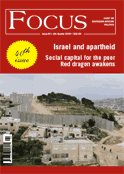An edited version of a recent speech by Jerry Rawlings advocating a greater African input on democracy.

Lawrence Schlemmer diagnoses extravagant ANC promises as a cause of the ruling party's problems.
Pierre du Toit argues that the restoration of social cohesion in primary units is as important as government grants.
Benjamin Pogrund disagrees with those who describe Israel as an apartheid state and labels their views as facile.
Summary - Liberation movements come to power amid high hopes that they will usher in more equitable societies. Inevitably, however, they transmute into political parties and become increasingly mundane. Their leaders shed their glamour and, frequently, become scheming politicians.
Joel Pollak scrutinies the varieties of political opposition and deduces that robust opposition is the best option.
Aubrey Matshiqi believes South Africa needs to examine the contribution of corruption in the decline of political morality.
Patrick Laurence is impressed with China's economic advances but concludes it needs to pursue political reform.
David Welsh reflects on rising political tension in the Western Cape particularly between coloureds and blacks.
We note the latest of Philip Tobias’s achievements — marking his 80th birthday with the publishing of a new book, a memoir, eminently accessible to the layperson.
Eddy Maloka and Bhekinkosi Moyo present a plan to secure permanent African representation on the Security Council.

